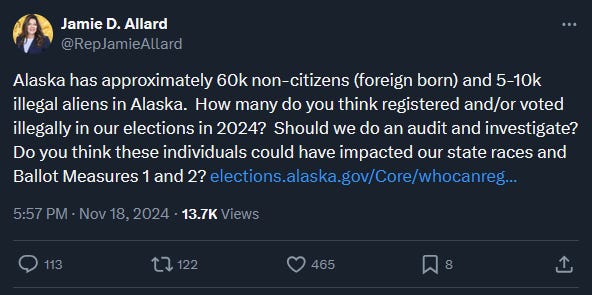It’s Tuesday, Alaska!
In this edition: With Alaska closing in on finalizing this year’s election results, the initiative to repeal the state’s fledgling open primary and ranked-choice voting system is now narrowly trailing. The conservative-backed effort has had a lead that’s dwindled as votes have been counted, with many prognostications that it would run out before the final votes are counted. There are still about 5,000 votes to tally and a recount to get through before it’s over, but that hasn’t stopped far-right legislators from jumping to election conspiracy because that’s what politics have become.
Current mood: 😤
Like clockwork
The biggest unknown from Alaska’s election is the fate of the state’s open primary and ranked-choice voting system. Conservatives rankled by the fact that voters opt for the more moderate options when given a choice are banking big on Ballot Measure 2 returning the state to the semi-closed partisan primaries of the past. And things were looking good for the repeal on election night, but its lead has continuously dwindled as more absentee, early and questioned ballots have been counted. The question has been whether the lead or the remaining votes would run out first.
That tipping point came on Monday when about 4,000 ballots were added to the state’s tally, breaking nearly 2:1 against the repeal. The initiative’s nearly 800-vote lead has been erased and was down by 192 votes. On Tuesday, as of writing this, the “no” side’s lead had narrowed to 45 votes.
Given the close margins and trends in absentee, early and questioned ballots, several people with a handle on high school algebra predicted the flip. (I’m not among them because, given the general bleakness of the election, I didn’t want to get hopes up.)
There’s still quite a bit left before we know that Alaska’s experiment in carving out a space for bipartisan-minded centrists will live on. There are still another 5,800 ballots to tally (mostly from Anchorage and rural Alaska, which have trended toward no so far), and an automatic recount is ahead. Regardless of the outcome, it’ll be another consequential Alaska race decided by the narrowest of margins.
…or, if you’re a far-right Republican, it’s another sign of a grand conspiracy against far-right Republicans because of course. Why wouldn’t it be?
Like clockwork, two of the Legislature’s most extreme Republicans (especially now that Rep. David Eastman looks headed to defeat) blamed the initiative’s apparent loss on hackers and “illegal aliens” in the hours following Monday’s update.
Eagle River Rep. Jamie Allard, who was kicked off the state Human Rights Council after she defended Nazi references in state-issued license plates, took to X to claim that “illegal aliens in Alaska” could be responsible for the passage of a ballot measure raising the minimum wage and the failure of another to repeal open primaries.
While Ballot Measure 2 is currently failing by 45 votes, Ballot Measure 1 — which raises the minimum wage and guarantees paid sick leave for most workers — passed with a nearly 40,000-vote margin. Coincidentally, the minimum wage initiative’s margin is much smaller than when voters approved the last minimum wage hike a decade ago.
The Alaska Beacon also reported in October that there’s no evidence of widespread noncitizen voting or registration in Alaska. And there’s also the small fact that the Alaska Division of Elections is led by a Trump-supporting director in Carol Beecher, who refused to say Joe Biden fairly won the 2020 election.
Meanwhile, Homer Rep. Vance—who drew headlines after she derailed a hearing on tribal justice because it didn’t cater to white women — expressed her dissatisfaction with the results by penning an op-ed claiming Alaska has an “election integrity crisis” and insisted that the certification of the state’s election be delayed.
Her claim isn’t fixated on immigrants but on a 2020 breach that revealed the personal data of about 113,000 Alaskans. She doesn’t have any evidence that it affected this election. Still, she says it warrants putting the certification on hold as they complete a “comprehensive audit” of all 113,000 voters. At the time of the hack, the state said it didn’t affect the voting systems and “the purpose of the unlawful access was to spread propaganda and shake voter confidence — not to impact the election results.”
And judging by Vance’s reaction, it’s done precisely what it was intended to do.
The breach has been a critical tool for Vance and other conservative Republicans to drive their election agenda and rile up the base. It hasn’t produced serious election integrity efforts but, by and large, has fueled renewed GOP efforts aimed at making it harder to vote by hastening voter roll purges and ending automatic voter registration. Meanwhile, meaningful reform efforts, such as addressing the state’s high rejection rate of rural voters’ ballots, were blocked because House Republicans feared it would help Democratic U.S. Rep. Mary Pelotla (who, judging by Republican Nick Begich’s big lead, must have been left out of the hackers and “illegal aliens” plans).
In the big picture, the claims mirror the tactics of right-wing election deniers, who have been quick to blame losses on baseless conspiracies rather than accepting they might just not be that popular with voters. As Alaska’s open primary and ranked-choice voting system has shown, voters typically opt for the more moderate legislators when given a choice between a moderate Republican and a far-right Republican.
Those dynamics explain why Alaska’s Legislature will have two bipartisan majorities when it convenes in January.
Stay tuned.






